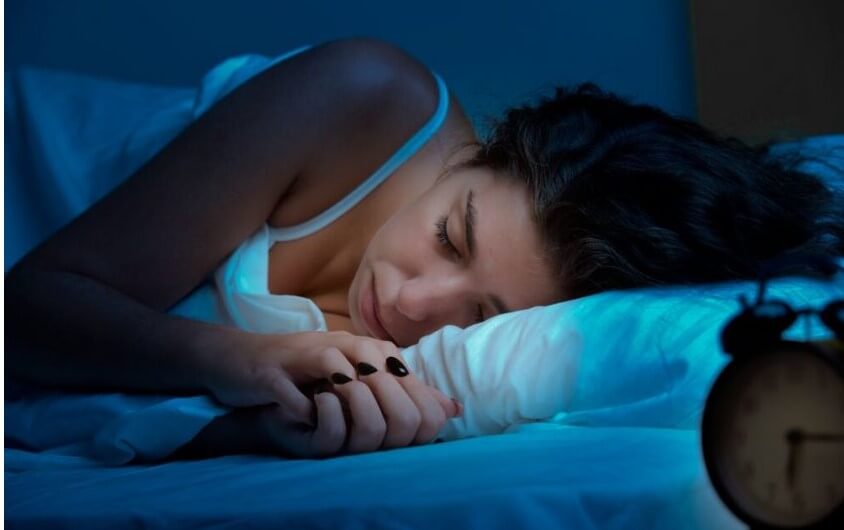Everyone needs sleep, but not everyone gets enough and avoiding insomnia is something that is top of mind of a whole lot of people. I know—massive understatement, right? Insomnia in general, and not getting enough sleep seems to be a universal problem. It doesn’t matter whether you’re young or not-so-young, in the prime of your youth (let’s call that our 20s and 30s) or in midlife (let’s call that our 40s, 50s) or even later in life (60s, 70s, and beyond), insomnia can get you. It doesn’t matter if you’re male or female, insomnia doesn’t discriminate. It likes us all! For many of us, falling asleep isn’t the problem, it’s staying asleep that’s the issue. So, how do you manage avoiding insomnia, get enough sleep and also manage to stay asleep on a nightly basis? Great questions—let’s see what the experts recommend.
If you’re not convinced that sleep is all that critical to your health, check out: Go To Bed! Why Sleep Is the Most Important Part of Your Workout Routine
Avoiding Insomnia — Get on a Sleep Schedule
One of the key things to avoiding insomnia is routine. The body likes a routine, so one of the most recommended sleep solutions to avoiding insomnia is to get yourself on a sleep schedule. Try to go to bed, or at least settle in and relax, at about the same time every evening. Getting into a routine helps tell your brain “this is how we do it” (now you have that song in your head, don’t you?), and hopefully once your body gets accustomed to the routine, it will cooperate and start shutting down when you want it to. Ideally, you’ll get to bed when it’s dark outside and wake up soon after it’s light outside, since this works with your circadian rhythm rather than working against it, but I realize that not everyone is on this kind of a schedule. If you are a day sleeper, make sure you’re sleeping in a very dark room that hopefully blocks noise as well as it blocks light.
Avoiding Insomnia — Watch When You Work Out
Working out is not only great for staying fit and managing weight, it’s great for helping mitigate stress and laying a foundation for good sleep. When you’re focused on avoiding insomnia, those evening workouts might not be doing you any favors. The endorphins generated as a result of a workout can jazz up your body and your brain and make settling down and getting to sleep at a decent hour more difficult. I love working out in the evenings, so I know how hard it is to think about changing that up. But if you suffer with sleep issues, maybe it’s worth it to give it a try. A tough workout in the morning, or even at noon during your lunch break, will help ensure your body is exhausted enough to sleep well at night. And if you can’t get a vigorous workout in earlier in the day, don’t despair, all is not lost as it relates to your workout. Even a simple walk with the dog or your significant other (or both) after dinner in the evening will not only help with digestion after your evening meal, it might put you in a more relaxed state and get your body prepped for sleeping in a few hours. Most importantly, try not to work out within a couple hours of bedtime, since doing so will actually keep you awake longer.
Start a Relaxing Bedtime Routine
If you want to fall asleep and stay asleep all night, another bit of helpful advice is to come up with a habit or two that will relax you before bed. This could be reading, meditating, or simply deep breathing. I love doing Yoga an hour or so before it’s time to sleep. I find it totally relaxes me, stretches me out, and puts me in kind of a Zen frame of mind. I also take advice my chiropractor and wellness practitioner friend Dr. Michelle Robin gave me years ago specifically intended to help my goal of avoiding insomnia. She gave me a pillow shaped like a cylinder and told me lay flat and put the pillow under my neck. This stretches out your neck after many hours of looking down at laptops or devices all day, which most of us do way too much. And she told me to lay there, in a darkened, quiet room, letting that pillow stretch my neck and to reflect on the things that I’m grateful for. And let me tell you something—does it ever work! Ten minutes of that practice on a daily basis can do wonders for your neck, your soul, and your sleep.
Whatever you decide on when it comes to the nuances of your bedtime routine, just make sure it doesn’t involve light—including the blue light that electronics emit—because that will keep you awake.
Try Sleep Guided Meditation
Sometime last year, my Pilates instructor introduced me to Jennifer Piercy’s Yoga Nidra for Sleep, a guided meditation specifically designed for sleep. For the record, I am pretty much the last person on the planet you could expect to be into guided meditation, so I took this advice and thought “Yeah, sure, this will be totally lame and totally not my style.” I could not have been more wrong.
Oh. My. Goodness. I can’t tell you how soothing Jennifer’s voice is and how much I love going to sleep at night by way of her guided meditation. Do this, please, if you have trouble getting to sleep and are working on avoiding insomnia. And if you wake up in the middle of the night, listen to Yoga Nidra again. It puts me right back to sleep every time. Even my 12-year-old twins love going to sleep to the melodic voice of Jennifer Piercy—it really is our favorite nighttime thing. Check it out yourself, I’m pretty sure you’ll love it—
Thinking about Yoga but not yet into it? Here’s how y=Yoga can help you get a good night’s sleep: Sleeping Better At Night with Yoga [And Other Things]
Get Your Worries Out in the Open
A common reason people find it hard to fall asleep and stay asleep is that they’re too busy worrying. When you’re avoiding insomnia and if you suspect that anxiety about life is playing a role in your insomnia, grab a notebook and write down the things that make you anxious or fearful any time you start to think about them. You might think trying to ignore them is best, but this makes your brain worry even more, making it hard to sleep. So keep a notebook next to your bed so you can get these fears out in the open. Once you write them down, try to put them out of your mind until morning. I know, that sometimes sounds easier said than done, but give it a try. Then take a look at that list in the morning, with a fresh mind and a fresh eye, and figure out how to work on solving them.
Try a Melatonin Supplement
If none of the other tactics for avoiding insomnia work, you can always try taking a supplement that gets more melatonin into your system. Sometimes the inability to fall asleep is caused by a lack of melatonin in your body, which is an issue because one of the main reasons your body makes melatonin is to help you fall asleep. Fortunately, most melatonin supplements are all natural and safe to take on a temporary basis so you can sleep better.
Figure Out Why You Keep Waking Up in the Middle of the Night
Maybe you don’t have trouble falling asleep, but you keep waking up randomly. You may be able to stop this by pinpointing why. For example, if some nights you wake up to go to the bathroom, make sure you empty your bladder right before going to bed, and try to avoid drinking anything if possible in the hours leading up to bedtime. If you’re waking up in the middle of the night because you’re sweating, consider switching to a lighter blanket or using just a top sheet, and make sure you have the air conditioner on or at least a fan blowing on you. And if random loud noises outside your bedroom keep waking you up, get some white noise—such as soft music, a whirring fan, or a loud noise machine—so you don’t hear sudden noises when you’re sleeping. I am a big believer in white nose, and a white noise app (called simply White Noise) that I found in the iOS ecosystem a few years ago has made getting to sleep and getting back to sleep if I happen to randomly wake up so much easier. I paid $2.99 for it and it was quite possibly the best $2.99 I ever spent. You can find these apps for free, too, so look around, find one, download it and give it a try.
If you are dealing with peri-menopause or menopause issues, insomnia is very common. Find a doctor that specializes in care of women at midlife—it will be the best investment in yourself you can make. A doctor can help you get your hormones where they need to be, which will help alleviate the symptoms you’re struggling through, including insomnia.
Remember, You’re Not Alone
If you’re avoiding insomnia and trying to get to sleep and stay asleep, you are absolutely not alone. That might not make it any easier when you’re slogging it through a day on not enough sleep, but know that this is a common problem and that learning more, talking with others, and trying new things definitely can’t hurt. Try a few of these tips here, or several of them, and see if they help. If these things don’t help, try some different ones. Talk with your doctor about your insomnia, explore possibly going to a sleep clinic and getting further testing, and no matter what, don’t give up until you can get some relief. Sleep is critically important to your health and well-being, your body’s operating system relies on sleep, and it’s too important to just live being tired. There are also some resources linked in the “other resources” section below that have some interesting and unusual tips that might be helpful as well, so do check them out.
Want to Try FitFormula Sleep?
We’re excited to soon be rolling out FitFormula Sleep, an all natural, blueberry flavored direct dissolve powder. We developed this product based on customer input and feedback, and our community’s request for a trusted, reliable, natural sleep formula. We hope to have FitFormula Sleep in hand by early to mid August, and if you’d like to sample it, we’ll be offering a limited amount of free samples. Want to get yours? Get on the waiting list by emailing us at hello@fitformula.com with your name and shipping address. These limited samples will be available on a first come, first served basis, so sign up today and ensure your spot on the list!
Here are some other ideas on getting better sleep: 5 Tips to Help You Get a Good Night’s Sleep
More resources on how to avoid insomnia:
13 Science-Backed Tips to Fall and Stay Asleep
11 Unconventional Sleep Tips: How To Get to Sleep and Stay Asleep
Healthy Sleep Tips
The original version of this article was first published on FitFormula.
- Sesame Beef and Broccoli Recipe - March 16, 2020
- Easy and Best Strawberry Biscuit Recipe - March 15, 2020
- Carb Confusion is Real. Are Carbs Evil? Let’s Do Some Myth-Busting - January 14, 2019









